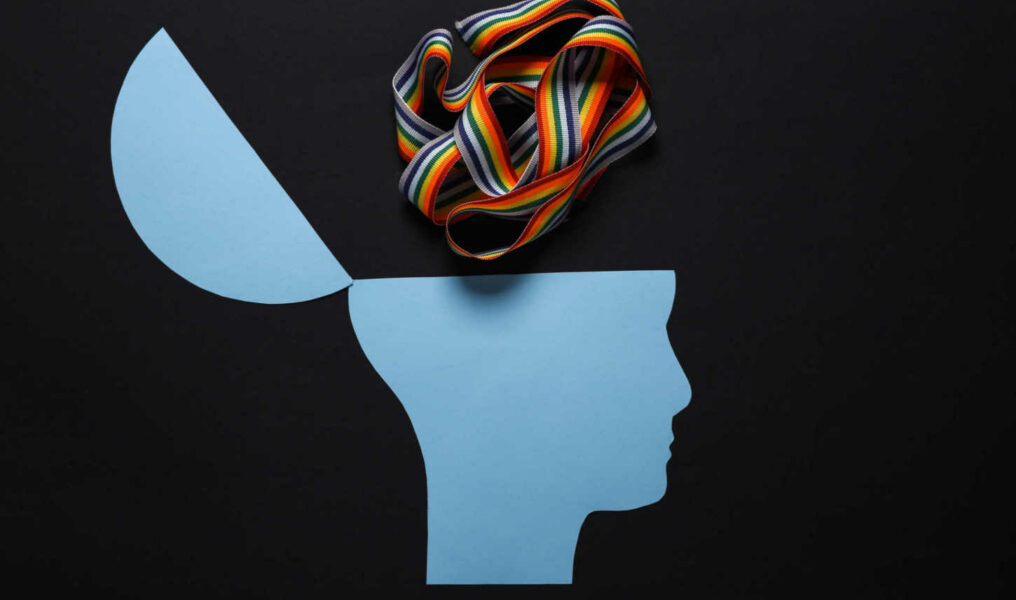Therapy Is Expensive, But These Queer Social Media Healers Are Just a Tap Away
How Twitter, TikTok and Facebook creators are centering LGBTQ+ mental health care

When it comes to LGBTQ+ mental health, representation matters.
In fact, it’s at the heart of why Chris Grant, aka “The Queer Therapist” (@theqtherapist on Instagram), has dedicated so much professional time fostering a strong social media presence. Grant’s practice is based in Scotland, but their followers come from around the world.
“Because most queer folk don’t grow up with positive representation of queer people, they lack mirrors for identity development,” explains Grant, who identifies as trans and nonbinary. Without those mirrors, they say, queer people can struggle with identity development as a result of internalized stigma.
Positive LGBTQ+ representation on social media is helping to shift the narrative away from that stigma and shame. “Having a therapist who is able to positively mirror aspects of your identity is extremely powerful,” they say.
Grant says people in marginalized communities often thrive online and use social media to express their authentic selves long before they do so in the real world.
Even Grant’s disclosure about their core identity as a trans person holds power. That disclosure, they say, may seem radical to some, but as Grant points out, cisgender therapists unintentionally disclose their gender every day without wondering about representation. “Really, this [approach] isn’t something new when it comes to white, cisgender, heterosexual, middle class folk, but when it comes to marginalized communities, it is new terrority.”
A post shared by The Queer Therapist | Chris Sheridan (@theqtherapist)
“So much of our work as therapists relies on trust, but we often don’t realize that building that foundation can start long before you meet the client,” they add. A social media presence can allow potential clients to make an assessment on their own. “And, if you have aligned your posts with your authentic practice, then you have started to build a relationship already,” they say.
Grant does caution that a large social media platform can create a power dynamic — a therapist’s voice can become amplified in an online community. It’s something they carefully consider in their interactions, but ultimately, social media has been a tool Grant has used for good. “It can level the playing field for clients who may otherwise find the idea of therapy intimidating or inaccessible,” they say. “I have certainly found a much more diverse client base through this strategy.” Plus, the interconnected nature of the internet has led Grant to make connections throughout the world with individual clients and national organizations working to remove mental health stigma.
That interconnected virtual world includes a long list of queer therapists who are having a bit of a moment, engaging with people seeking help, education and, sometimes, entertainment. Here are a few on that list to consider.
Dr. Joe Kort
Kort (@drjoekort) is a hometown success story. In addition to running The Center for Relationships and Sexual Health in Royal Oak, he famously introduced the concept of “sides” (long before Grindr introduced the term earlier this year). As the doctor wrote in 2013, a side is an alternative to common terms like “top” and “bottom” and describes a male-identifying person (of any sexual identity) who refrains from anal sex. Kort’s 5,700-member Facebook Group, “Side Guys,” is a judgment-free zone where, he writes, “loneliness and shame do not exist.”
Kort says he uses social media to promote his brand and to educate the public about mental health — particularly for those who can’t afford therapy or who are not represented in the mainstream. Social media “encourages queer people to seek mental health care and to know which therapists are not only friendly, but LGBT-informed,” he adds, noting that often, therapists claim to work with the community, but aren’t actually knowledgeable.
Kort’s upcoming book, “Choosing Sides,” out later this year, shines a light on people who identify as a side through the lens of their experiences navigating their sexual preferences and struggles like managing the loneliness that can occur around other gay men who do identify as tops or bottoms.
Dr. Kort also hosts a popular podcast, “Smart Sex, Smart Love” that explores relationship topics ranging from narcissism to fetishes like findom, a financial BDSM dynamic, and maintains an active blog and YouTube channel.
If you have tried to heal with your parent and they refuse and then die, here is some food for thought. pic.twitter.com/8w4avmgL43
— DrJoeKort (@drjoekort) August 8, 2022
Therapy To A Tea, Co.
Therapy To A Tea’s (@therapytoateaco) Instagram channel focuses on mental health within the queer and trans BIPOC community, including neurodiverse and gender expansive people. The channel is an extension of the practice group’s D.C.-based office, but followers come from all over the world to reflect on the team’s real-talk approach to topics like trans kids, relationship boundaries and self-care.
Expansive Therapy
Need a pick-me-up? This California- and New York-based LGBTQ-focused practice group uses Instagram (@gaytherapy) to communicate positivity to LGBTQ+ community members. Pro tip: This is one of those rare internet rabbit holes where the comments are almost as good as the content.
Lesbian Counselor
The Lesbian Counselor TikTok account (@lesbian_counselor) explores a niche need in the LGBTQ+ community — reconciling faith with nonconforming gender and sexual identities. The account is the social media hub for virtual LGBTQ+ therapy practice The Christian Closet. Founder Candice Czubernat shares messages of encouragement and explores an exhaustive list of mental health topics.
@lesbian_counselor #greenscreen #gay #lgbt #lgbtq #faith #mentalhealth #gayandchristian ♬ Love Of My Life - Metrow Ar
enby_therapist
Shauna Tepper’s @enby_therapist TikTok channel focuses on all things gender nonconforming, with a special focus on advocacy for gender nonconforming youth and mental health resources for LGBTQ+ kids and their parents. Over 12,000 followers tune in to watch Tepper tackle topics like learning to self-advocate and funny clips about their work as a therapist.










